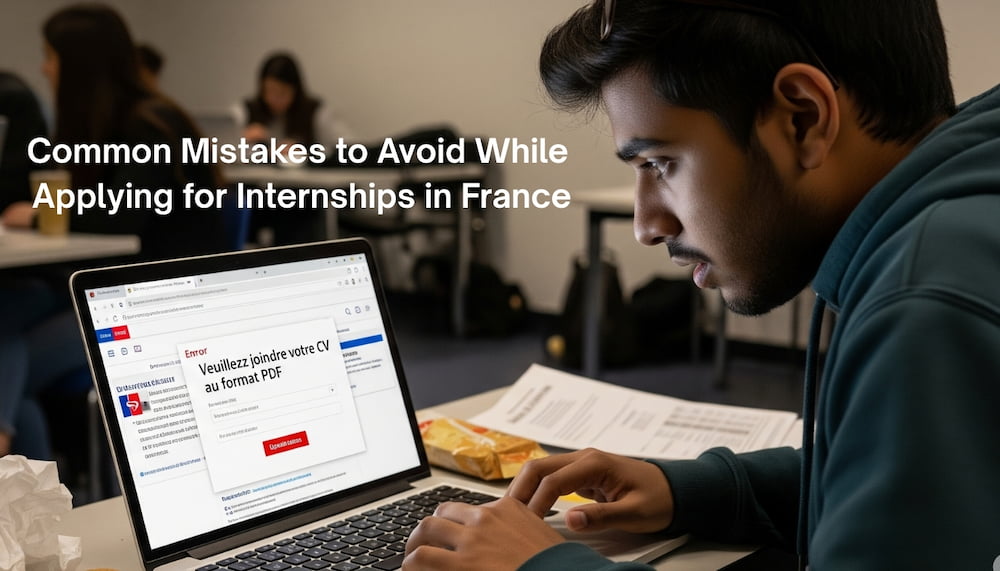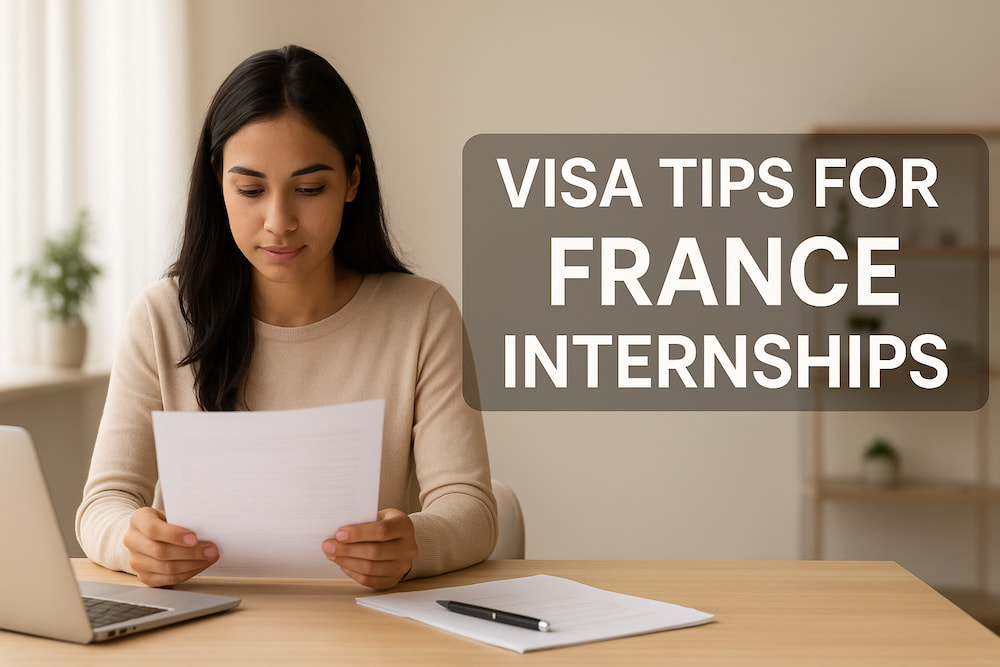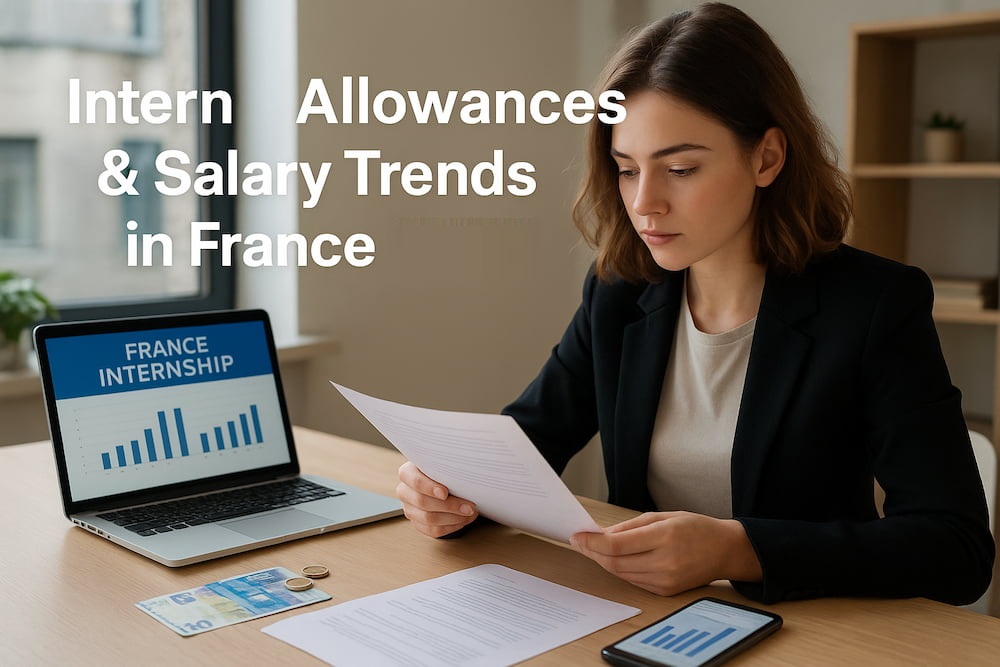
Common Mistakes to Avoid While Applying for Internships in France
Landing an internship in France is like unlocking a door to a world of opportunity—think vibrant Parisian offices, Michelin-star kitchens, or charming Riviera hotels. But let’s be honest: the process to apply for internships in France can feel like navigating a maze, especially for international students unfamiliar with internship France requirements. One wrong turn, and you could miss out on a life-changing experience.
I’ve spoken with students who’ve stumbled and others who’ve soared in their applications, and the difference often boils down to avoiding a few common pitfalls. From generic resumes to last-minute submissions, these mistakes can dim your chances of standing out. In this comprehensive 1,500-word guide, we’ll uncover the most frequent errors when applying for internships in France, share practical internship application tips France, and show you how to shine in a competitive field. Ready to make your application a masterpiece? Let’s dive in!
1. Skimming Over Internship France Requirements
Every internship posting comes with its own rulebook—eligibility, paperwork, language skills, you name it. Yet, one of the biggest mistakes when applying internships France is rushing to hit “submit” without dissecting the fine print. I heard from a student who applied for a culinary internship only to realize post-submission that a Convention de Stage (a mandatory French internship agreement) was required, derailing her timeline.
How to Avoid It:
- Read Thoroughly: Study the job description like it’s your final exam. Note qualifications, deadlines, and documents.
- Check Language Needs: Some roles demand basic French, while others are English-friendly. Clarify this upfront.
- Confirm Duration: Ensure the internship’s timeline aligns with your availability.
- Prepare Documents: Secure essentials like the Convention de Stage, often required for non-EU students. Learn more in this guide to French internship contracts.
Pro Tip: Partner with the best internship consultancy for internship in France, like Destiny Calling, to match you with roles that fit your profile and handle paperwork complexities.
2. Sending a One-Size-Fits-All Resume
Picture this: a hiring manager sifting through 200 applications spots your resume—identical to the one you sent to 10 other companies. It screams “I didn’t try.” Generic CVs are a top mistake, signaling a lack of genuine interest in the role.
How to Avoid It:
- Tailor Your Resume: Highlight skills specific to the internship—e.g., for a hotel role, emphasize customer service over unrelated retail experience.
- Showcase Relevant Experience: Mention any multicultural or international work, even from school projects.
- Keep It Professional: Stick to 1–2 pages, use a clean layout, and avoid flashy fonts. Need formatting tips? Check this resume crafting guide.
A tailored resume shows you’re serious, boosting your odds in a crowded applicant pool.
3. Skimping on the Cover Letter
In France, the lettre de motivation (cover letter) is a big deal—sometimes even more than your CV. A generic or missing letter can sink your application faster than you can say “croissant.” One intern shared how her heartfelt, role-specific letter landed her a spot at a top Paris hotel over candidates with fancier resumes.
How to Avoid It:
- Personalize It: Explain why this company excites you—reference their projects or values.
- Match Skills to Role: Connect your experience to the job’s needs, like linking event planning skills to a hospitality internship.
- Show Cultural Enthusiasm: Express your love for France’s culture, even if it’s just a nod to its cuisine or art. For more, see this cover letter tips post.
A compelling letter makes you memorable, setting you apart in the application stack.
4. Overlooking Language Skills
Even for English-speaking internships France, showing an effort to learn French can be a game-changer. Some students skip mentioning language skills altogether, missing a chance to impress. A recruiter once told me that candidates with even basic French phrases stood out for their cultural adaptability.
How to Avoid It:
- List Language Efforts: Note any French courses, apps like Duolingo, or self-study.
- Highlight Improvement: Mention if you’re actively learning French, signaling commitment.
- Use French Sparingly: Drop polite phrases like “Bonjour” or “Merci” in emails or interviews to show respect. Want to start learning? Try this French language tips guide.
Even a little French goes a long way in showing you’re ready to embrace the experience.
5. Procrastinating on Applications
Timing is everything, yet many students wait until the last minute, only to find prime internships snapped up. In France, top roles at companies like Relais & Châteaux or tech startups often close months in advance. Data from internship platforms shows early applicants are 40% more likely to get interviews.
How to Avoid It:
- Start Early: Begin your search 3–6 months before your desired start date.
- Track Deadlines: Use a calendar or app to stay on top of application cutoffs.
- Apply Promptly: Early submissions get more recruiter attention. For strategies, check this guide on finding internships early.
Early action gives you a head start in a competitive market.
6. Underpreparing for Interviews
Some students assume internships are a breeze to land and skip interview prep, only to fumble when asked, “Why France?” or “What do you know about us?” French employers expect professionalism, even for interns. One student I spoke with nailed her interview by researching the company’s sustainability initiatives, impressing her eco-conscious employer.
How to Avoid It:
- Research the Company: Know their mission, projects, or recent news.
- Prepare Answers: Practice responses to questions like “Why this role?” or “How do you handle challenges?”
- Add French Flair: Learn basic greetings like “Enchanté” (Pleased to meet you) for a polished first impression. Need interview help? Read this interview prep guide.
Solid prep makes you confident and memorable.
7. Ignoring Visa and Legal Requirements
For non-EU students, visa hurdles like the Convention de Stage or internship visa can trip you up if ignored. One student missed a deadline because she didn’t realize her university needed to sign her internship agreement, delaying her start by months.
How to Avoid It:
- Check Visa Needs Early: Research requirements for your nationality—non-EU students often need a “Stage” visa.
- Secure the Convention de Stage: This tripartite agreement (you, employer, university) is mandatory for most internships.
- Plan Ahead: Start visa processes 2–3 months in advance. For details, see this visa application guide.
Destiny Calling’s visa support can make this process hassle-free, guiding you every step.
8. Skipping the Follow-Up
Sending your application and crossing your fingers isn’t enough. A polite follow-up can show enthusiasm and keep you on the recruiter’s radar. An intern I know landed a role at a Michelin-star restaurant after a courteous email nudged the hiring manager to review her file.
How to Avoid It:
- Wait Strategically: Follow up 1–2 weeks after applying.
- Keep It Brief: Thank them for considering you and inquire about next steps.
- Stay Professional: Avoid pestering—one or two emails suffice. For follow-up templates, check this application follow-up guide.
A follow-up can be the nudge that gets you noticed.
Final Thoughts
To successfully apply for internships in France, dodging these common mistakes is key to standing out. Take time to understand internship France requirements, tailor your resume and cover letter, show language effort, apply early, prep for interviews, secure visas, and follow up politely. These steps transform your application from forgettable to unforgettable.
Feeling overwhelmed? You don’t have to go it alone. Destiny Calling, the best internship consultancy for internship in France, offers personalized guidance, from crafting standout applications to navigating visas and language prep with their Fluentzea program. Ready to launch your French adventure? Explore their France Internship Programs and turn your dream into reality. Your internship in France awaits—make it happen!

Why Internships in France Are a Career Investment, Not Just Experience

Visa Tips for France Internships: Everything International Students Should Know

Skills You Will Gain From Internships in Japan (Beyond Your Job Role)

LinkedIn for Internships: How to Get Noticed by Recruiters in France

Intern Allowances & Salary Trends in France 2026 -What Students Should Expect
